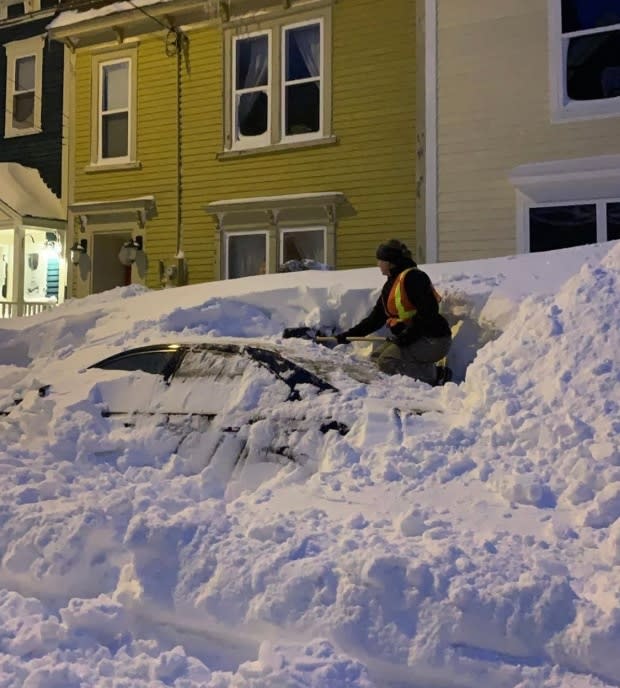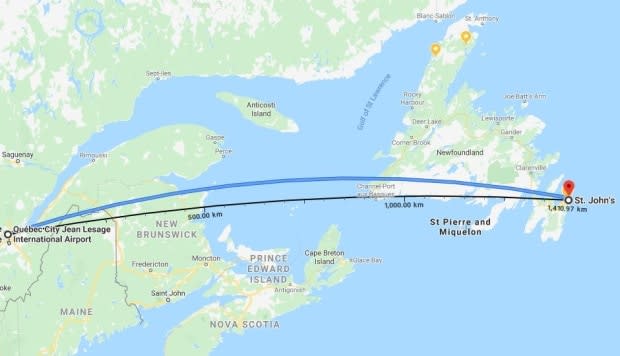St. John's has received a full Shaquille O'Neal of snow since Christmas Eve

As the ongoing state of emergency in St. John's winds down, the city can now boast that it is the snowiest capital city in Atlantic Canada — by a long shot.
According to Environment Canada, St. John's has seen 256 centimetres since Oct. 1. The vast majority of that accumulation happened between Christmas Eve and Jan. 19.
In that 27-day timeframe, the city saw 221 cm in several significant snowfalls, including an unforgiving blizzard last Friday that has left the city cleaning up ever since, with the help of the Canadian Armed Forces.

The average snowfall from the start of October to the end of January is 176 cm — the average height of a North American man — which is about on track if you subtract the major blizzard.
"It's really just one storm that's throwing everything off," said Justin Boudreau, a meteorologist with Environment Canada's weather office in Gander.
That one storm brought St. John's from snowfalls equalling the average height of a man to beyond the average height of a basketball superstar.
Put it in some context
It might be hard to visualize these snowfall amounts. Despite the metric system being widely used by our country, the American style of feet and inches is still ingrained in many people's minds.
Since Christmas Eve, St. John's has recorded 7'3" of snow.

By comparison, former Los Angeles Lakers centre Shaquille O'Neal is 7'1" and former St. John's Edge player Satnam Singh is 7'2".
The St. John's snowfall is just one inch short of the late actor and wrestler Andre the Giant.
As for the total since the beginning of October, 256 cm stacks up to be about 8'3", which nearly the exact height of Sultan Kosen, the Kurdish man who holds the current title of the world's tallest person.
That's just the snowfall, too. Heavy drifting, much of it caused by hours of hurricane-force winds that continued well into Saturday morning, has left piles of snow that in some cases are higher than houses.
Lots of street to cover
Every day this week, St. John's Mayor Danny Breen has reminded residents of the monumental task the city faces to bring streets to a point where it is safe to drive and walk.
It's true — St. John's has a total of 1,400 kilometres of roads running throughout the city.

That is equivalent to the driving distance from St. John's to Port aux Basques and back to Grand Falls-Windsor.
As the crow flies, it's the same distance from St. John's to Quebec City.
State of emergency ending, more weather coming
Breen told CBC News Friday morning that despite the state of emergency coming to an end on Saturday morning, people should still remain off the road unless they absolutely need to go out.
"There's still a tremendous amount of work to go," he said.
Businesses are preparing to open after eight days of mandatory shutdown. Employees were allowed to return to their places of work on Friday to prepare for opening on Saturday morning.
In true St. John's fashion, people are already talking about the next storm.
On Thursday, Premier Dwight Ball stirred the public when he warned about 20 cm of snow coming on Monday, but Boudreau said right now that's not in the forecast.
St. John's could see a period of snow on Monday, but Boudreau said it will likely turn to rain.

If amounts stay between five and 10 millimetres, it will knock down the snow banks and clean up some of the mess before freezing again.
However, Boudreau warned the total rainfall could be between 10 and 15 millimetres, which could result in flooding, especially since many storm drains are covered in snow.
Breen said the city is keeping an eye on the forecast, and is worried about the weather.
He said staff will analyze their options each day.
"There's going to be a lot of discussion, even as we move towards Monday, about what is going to happen," he said.
Read more from CBC Newfoundland and Labrador


